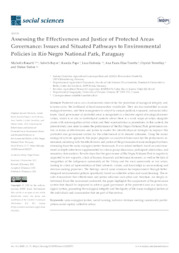Assessing the effectiveness and justice of protected areas governance: issues and situated pathways to environmental policies in Río Negro National Park, Paraguay.
Assessing the effectiveness and justice of protected areas governance: issues and situated pathways to environmental policies in Río Negro National Park, Paraguay.
Author(s): BONATTI, M.; BAYER, S.; POPE, K.; EUFEMIA, L.; TURETTA, A. P. D.; TREMBLAY, C.; SIEBER, S.
Summary: Protected areas are a fundamental element for the protection of ecological integrity and, in some cases, the livelihood of local communities worldwide. They are also embedded in socio-ecological systems, and their management is subject to various political, economic, and social influences. Good governance of protected areas is recognized as a decisive aspect of ecological conservation, which is at risk in institutional contexts where there is a weak scope of action alongside issues with misrecognition of key actors and their representation in procedures. In this context, the present study case aims to assess the performance of the Río Negro National Park governance system in terms of effectiveness and justice to enable the identification of strategies to improve this protected area governance system for the achievement of its desired outcomes. Using the social-ecological systems approach, this paper proposes an analytical framework for the performance assessment, including both the effectiveness and justice of the governance of socio-ecological systems, stemming from the socio-ecological justice framework. It uses mixed methods based on semi-structured in-depth interviews supplemented by a focus group discussion, participant observation, and secondary data analysis. Results show that the governance of Río Negro National Park is negatively impacted by low-capacity, a lack of human, financial, and technical resources, as well as the lack of recognition of the indigenous community of the Yshiro and the rural community as key actors, leading to a lack of representation of their interests, values, and knowledge in norm-making and decision-making processes. The findings unveil some windows for improvement through better-designed environmental policies specifically based on collective action and social learning. The results demonstrate that effectiveness and justice influence each other and, therefore, are deeply intertwined. From the assessment conducted, the paper highlights the components of the governance system that should be improved to achieve good governance of the protected area as a socio-ecological system, promoting the ecological integrity and the dignity of life (socio-ecological justice) of the individuals and communities that are part of this system.
Publication year: 2023
Types of publication: Journal article
Unit: Embrapa Soils
Observation
Some of Embrapa's publications are published as ePub files. To read them, use or download one of the following free software options to your computer or mobile device. Android: Google Play Books; IOS: iBooks; Windows and Linux: Calibre.
Access other publications
Access the Agricultural Research Database (BDPA) to consult Embrapa's full library collection and records.
Visit Embrapa Bookstore to purchase books and other publications sold by Embrapa.

